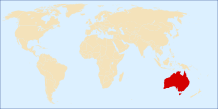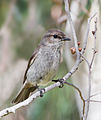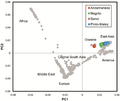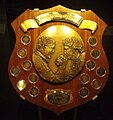| Showcase | Content | Interesting facts | Contributing |
Introduction

Australia, officially the Commonwealth of Australia, is a country comprising the mainland of the Australian continent, the island of Tasmania and numerous smaller islands. Australia has a total area of 7,688,287 km2 (2,968,464 sq mi), making it the sixth-largest country in the world and the largest country by area in Oceania. It is the world's oldest, flattest, and driest inhabited continent, with some of the least fertile soils. It is a megadiverse country, and its size gives it a wide variety of landscapes and climates including deserts in the interior and tropical rainforests along the coast.
The ancestors of Aboriginal Australians began arriving from south-east Asia 50,000 to 65,000 years ago, during the last glacial period. By the time of British settlement, Aboriginal Australians spoke 250 distinct languages and had the oldest living culture in the world. Australia's written history commenced with Dutch exploration of most of the coastline in the 17th-century. British colonisation began in 1788 with the establishment of the penal colony of New South Wales. By the mid-19th century, most of the continent had been explored by European settlers and five additional self-governing British colonies were established, each gaining responsible government by 1890. The colonies federated in 1901, forming the Commonwealth of Australia. This continued a process of increasing autonomy from the United Kingdom, highlighted by the Statute of Westminster Adoption Act 1942, and culminating in the Australia Acts of 1986.
Australia is a federal parliamentary democracy and constitutional monarchy comprising six states and ten territories. Its population of more than 28 million is highly urbanised and heavily concentrated on the eastern seaboard. Canberra is the nation's capital, while its most populous cities are Sydney and Melbourne, both with a population of more than 5 million. Australia's culture is diverse, and the country has one of the highest foreign-born populations in the world. It has a highly developed market economy and one of the highest per capita incomes globally. Its abundant natural resources and well-developed international trade relations are crucial to the country's economy. It ranks highly for quality of life, health, education, economic freedom, civil liberties and political rights.
Featured article -
On 9 February 1945, a force of Allied Bristol Beaufighter aircraft suffered many losses during an attack on the German destroyer Z33 and its escorting vessels; the operation was called Black Friday by the survivors. The German ships were sheltering in a strong defensive position in Førde Fjord, Norway, forcing the Allied aircraft to attack through massed anti-aircraft fire (FlaK). (Full article...)
Selected biography -
Bronwyn Bancroft AM (born 1958) is an Aboriginal Australian artist, administrator, book illustrator, and among the first three Australian fashion designers to show their work in Paris. She was born in Tenterfield, New South Wales, and trained in Canberra and Sydney. (Full article...)
Did you know (auto-generated) -
- ... that to learn the rules of American football, Australian Adam Korsak, who was named the best college punter in 2022, played Madden NFL 06 and watched Any Given Sunday?
- ... that Holly Ringland wrote her second book while stuck in Australia for three years during the COVID-19 pandemic?
- ... that an Australian High Court case found a hotel chain to have used third-party contractors to avoid paying employees their required benefits?
- ... that indigenous Australian artist Daniel Boyd has depicted colonial figures including Captain James Cook and Governor Arthur Phillip as pirates?
- ... that Australian politicians may face the pub test?
- ... that Anna Burke was the second woman to give birth while a member of the Australian House of Representatives?
- ... that Australia's most threatened butterfly is confined to a native range of less than 10 square kilometres (3.9 sq mi)?
- ... that Turkish international soccer player Rojin Polat was named member of the "2021 All Schools Merit Girls Team" in New South Wales, Australia?
In the news
- 22 November 2024 – 2024 Laos methanol poisoning
- A second Australian tourist dies of alcohol poisoning in Vang Vieng, Laos, bringing the death toll from the incident to six. Eight others remain hospitalized. (ABC News Australia)
- 21 November 2024 – 2024 Laos methanol poisoning
- An Australian and a British tourist die after consuming poisoned alcohol in Vang Vieng, Laos, bringing the death toll from the incident to five. Nine others are hospitalized. (BBC News) (AP)
- 30 September 2024 – Australia–Tuvalu relations, Climate change in Tuvalu
- Tuvalu's climate minister denounces the Australian Labor government's decision to expand three coal mines as an existential threat to the nation, due to the role of the mines in causing rising sea levels that have forced mass displacement across Tuvalu's low-lying islands. (The Guardian)
- 28 September 2024 – 2024 AFL premiership season
- The Brisbane Lions defeat the Sydney Swans 120–60 in the Australian Football League Grand Final to win their fourth AFL premiership title. (The Guardian Australia)
Selected pictures -
On this day

- 1789 – For the purposes of understanding Aboriginal culture, Captain Arthur Phillip captures Bennelong and Colebec.
- 1910 – The Royal Australian Navy is established by the Naval Defence Act.
- 1985 – A man wearing a chicken suit walks into the Australian House of Representatives and sits on the government front bench. He is later removed.
- 2001 – The Socceroos lose 0–3 to Uruguay and fail to qualify for the 2002 FIFA World Cup.
- 2003 – Marilyn Warren is appointed Chief Justice of the Supreme Court of Victoria, becoming the first woman to head an Australian superior court.
General images
Topics
More portals
WikiProject
 |
 |

| |
Consider joining WikiProject Australia, a WikiProject dedicated to improving Wikipedia's coverage of topics related to Australia. The project page and its subpages contain suggestions on formatting and style of articles, which can be discussed at the project's notice board. To participate, simply add your name to the project members page.
As of 25 November 2024, there are 205,634 articles within the scope of WikiProject Australia, of which 594 are featured and 886 are good articles. This makes up 2.97% of the articles on Wikipedia, 5.33% of all featured articles and lists, and 2.18% of all good articles (see WP:AUSFG). Including non-article pages, such as talk pages, redirects, categories, etc., there are 526,520 pages in the project.
Associated Wikimedia
The following Wikimedia Foundation sister projects provide more on this subject:
-
Commons
Free media repository -
Wikibooks
Free textbooks and manuals -
Wikidata
Free knowledge base -
Wikinews
Free-content news -
Wikiquote
Collection of quotations -
Wikisource
Free-content library -
Wikiversity
Free learning tools -
Wikivoyage
Free travel guide -
Wiktionary
Dictionary and thesaurus








































































































